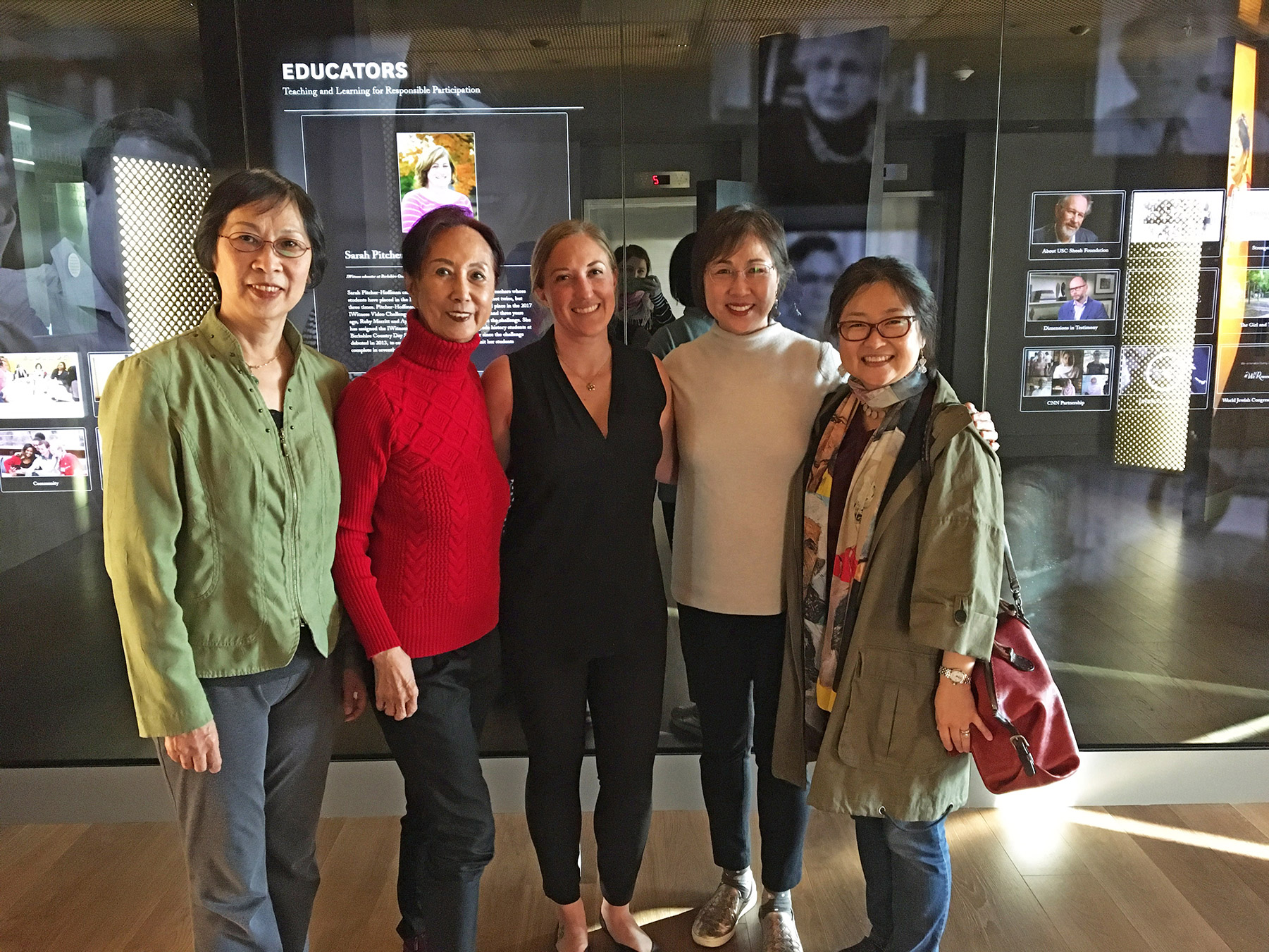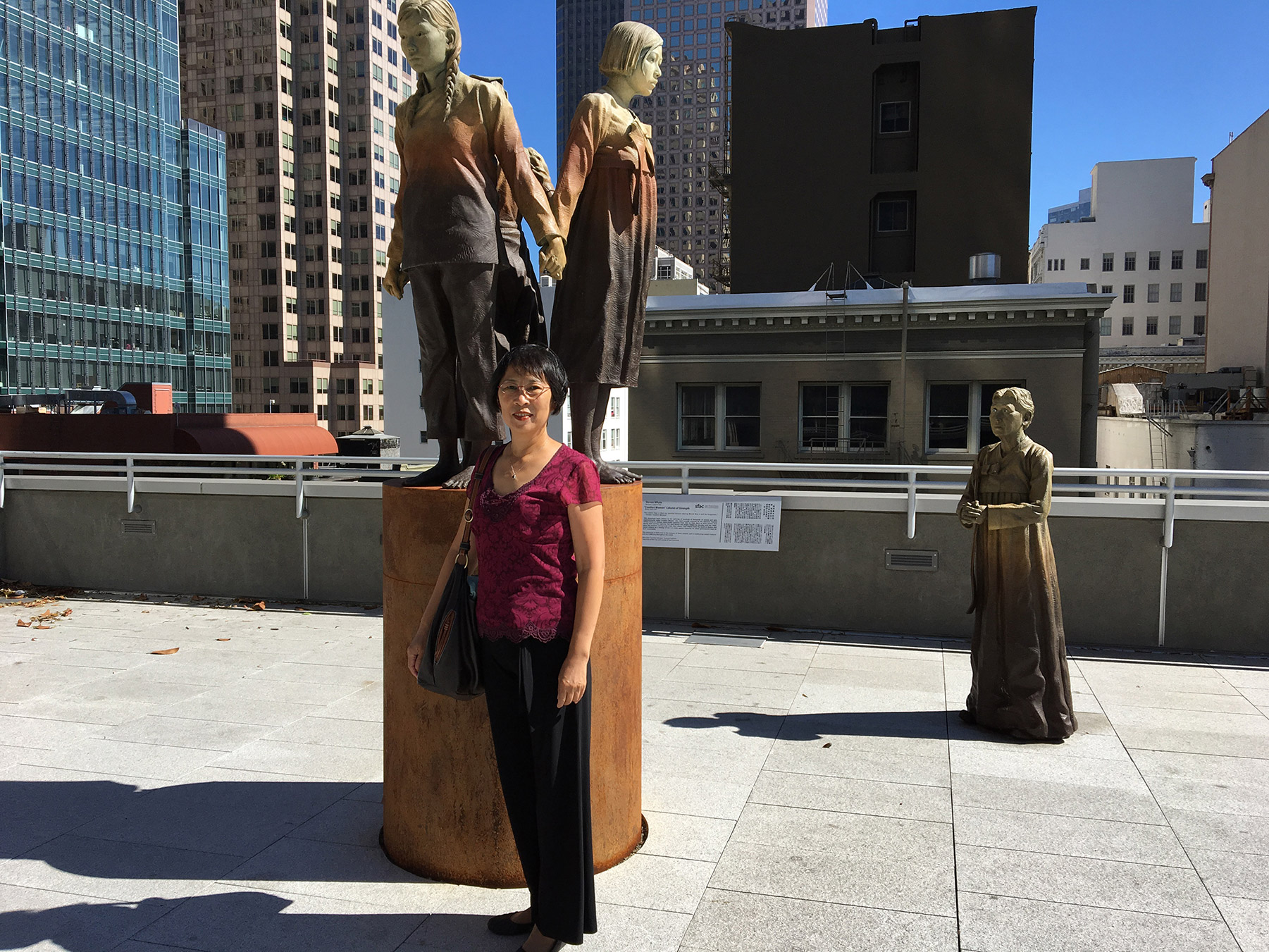Professor Collaborates on AI Project to Preserve History of Sexual Enslavement by Imperial Japan During WWII
In 2014, Peipei Qiu, Professor and Chair of Chinese and Japanese, delivered a riveting address at Vassar’s Fall Convocation, relating the horrifying stories of women and girls who had been raped and tortured by Japanese soldiers in the 1930s and 40s. Qiu collaborated with Chinese scholars in further researching that history after writing a groundbreaking book, Chinese Comfort Women: Testimonies from Imperial Japan’s Sex Slaves, which chronicled some of the women’s experiences.
Nine years later, Qiu is playing a major role in a new project employing artificial intelligence technology that she hopes will shed further light on the plight of these women. The initiative, titled The Eternal Testimony of Chinese “Comfort Women,” is based on interviews with 94-year-old survivor Peng Zhuying and enables participants to ask Peng questions about her experiences and hear her responses in a real-time conversation.
Peng was born in 1929, and when she was nine years old, her town in Hunan Province was bombed by the Imperial Japanese Army during the Japanese invasion, killing her mother and brother and leaving Peng blind. Six years later, Peng was kidnapped and imprisoned by Japanese troops.
The project preserving Peng’s oral history was inspired by Holocaust survivors’ testimonies preserved as part of the Dimensions in TestimonySM program by the University of Southern California’s Shoah Foundation. It is an international collaboration of the “Comfort Women” Justice Coalition (CWJC) in the U.S., the USC Shoah Foundation in San Francisco, and Nanjing Museum of the Site of the Lijixiang Comfort Stations in China. Qiu has been serving as Executive Director of the project since 2020. Lillian Sing and Julie Tang, two retired San Francisco Superior Court Judges and co-founders of CWJC, led the fundraising and initial planning for the project. Many individuals and organizations contributed to the project and Vassar students also provided assistance, Qiu said; USCSF provided the AI technology.
During the 1930s and 1940s, thousands of Chinese women and girls, called “Comfort Women” by the Japanese military, were kidnapped and brought to compounds where Japanese soldiers raped and tortured them.

In October 2020 the project team conducted a five-day interview with Peng in Yueyang City, China. During the process, the survivor was asked hundreds of questions and filmed on a green screen. To ensure continuity for the duration of the interactive experience, Peng wore the same clothing for each day of interviews and returned to a common resting position following each response.
The interview included an extensive list of topics that covered her life before, during, and after her enslavement during the war as well as off-topic responses in order to have the wide range of information needed to facilitate conversational interactions.
The recorded answers of the survivor were then preserved in the Dimensions in Testimony system developed by the Shoah Foundation in conjunction with USCs Institute for Creative Technology and their partners. Natural language processing and speech recognition allow the system to map an automated response that best fits a user’s question. To maintain the authenticity of the interview as a primary source, the filmed images and her answers are not animated, edited, or manipulated in any way.
“At the time, we were deeply saddened to see the aged survivors of the Japanese military sexual slavery passing away one by one,” Qiu said. “It was also extremely disturbing that warfare continued inflicting damages and suffering around the globe and rape was still used as an instrument of armed conflicts. We felt it’s critical to preserve the experience of speaking to the war victims so that future generations can learn from the traumatic past in a more engaged way and take action to prevent the occurrence of more crimes against humanity.”
The team’s U.S. members were unable to go to China for the in-person interviews in 2020 due to the COVID-19 pandemic, but they took part remotely and, along with their partners from the Nanjing Museum, generated much of the material that serves as the basis for Peng’s AI-driven answers to the questions participants pose.

Qiu said listening to Peng and re-living the horrors that she had written about before had been difficult for her. “Oftentimes I have to hold back my tears,” Qiu said, her speech cracking with emotion. “But I hope this project, and her voice, can help the younger generation learn about this kind of brutality.”
“Peng mentioned several times that she probably doesn’t have many days left, and her worst fear is that something like this could happen again,” Qiu continued. “She wants us all to remember history. We really need to learn from the events of past wars.”
The AI project is still undergoing further testing and refining, Qiu said. Currently, Peng’s answers are in Chinese, but they will soon be available in English. Those using the system can help “train” the system and improve the AI-generated dialog between the visitors and Peng, she said.
Qiu and Peng last spoke on October 14 when Peng took part in a webinar Qiu organized for the launching of the public beta test for the project. “She was very emotional,” Qiu said, “and at the conclusion of the webinar she thanked everyone for their support and said, ‘I suffered tremendously during the war…I hope all countries in the world work together for peace. No more war!’”